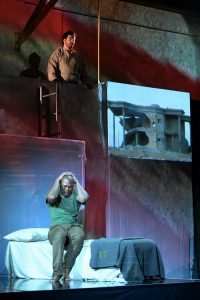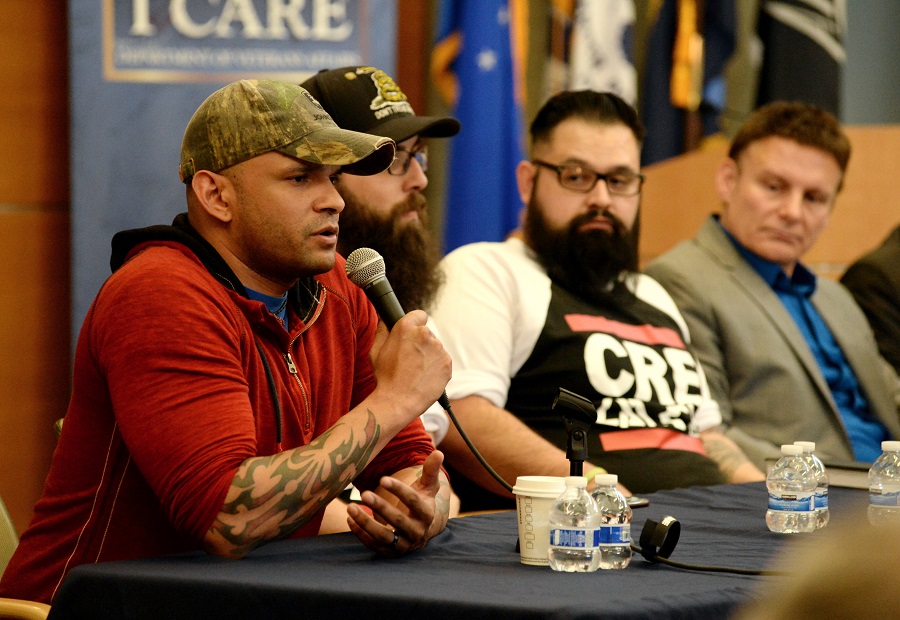By Leischen Stelter, editor of In Public Safety
Many combat veterans choose not to share their war experience, even with family and friends. However, former U.S. Marine Corps Sergeant Christian Ellis is sharing not only his worst experiences – watching his comrades die during the Iraq War and the struggles he faced afterwards – but allowing them to be the subject of an opera.
The Long Beach Opera in California recently premiered Fallujah, the first opera based on the Iraq war. The main character is based on Ellis and the majority of supporting characters are based on people he knew personally. The performance takes the audience through his combat war experience and the traumatic suffering he endured both during the war and afterwards.
Setting the Stage for Fallujah
In 2004, Ellis was a 19-year-old machine gunner with the Marines during Operation Iraqi Freedom. During the battle of Fallujah, his platoon was ambushed and an IED fractured his spine. Ellis was one of the few survivors in his platoon. After recovering from his injury, he returned home to find himself battling severe post-traumatic stress disorder (PTSD), which led him to attempt suicide four times.
In 2008, at the recommendation of his Veterans Affairs counselor, Ellis attended a fly-fishing event in Idaho with other combat veterans. During this outing, he met philanthropist Charlie Annenberg Weingarten. “Charlie asked me: ‘What is your dream? What do you want to do with the rest of your life?’” recalled Ellis. “Partially joking, I said, ‘I want to go back to singing. I’m a trained opera singer.’” Ellis’ response sparked Weingarten’s interest: He told Ellis he had been considering the idea of producing a musical about the wars that America had been involved in.
At Weingarten’s request, Ellis started writing about his war experience. “I spent a year writing a synopsis of my life: The people I knew, both past and present, including my fellow soldiers who had been killed in action,” he said. He presented his work to Weingarten, who then donated a grant to have the work turned into an opera.
“Writing that synopsis was the most challenging thing I’ve ever had to do,” Ellis said. “I don’t consider myself a writer, so I had to learn how to draft literary work in a way that others would understand what I had gone through.”
In 2010, Ellis was brought on board to collaborate with playwright Heather Raffo and composer Tobin Stokes. Raffo asked him to spend a week with her, talking about his war experience. “I spent 10 to 12 hours a day pouring out my life to her—my experiences in battle, the emotions I felt, my secrets, my fantasies—every element of who I was,” he said.
Talking to Raffo about his war experience was initially very challenging for Ellis because Raffo is an American with an Iraqi heritage. “It was hard for me, since all my military training and my experience fighting in Iraq had taught me to see Iraqis in a very different light than I see them now,” he said. “As I got to know her more, those walls were broken down, but it wasn’t easy at first.”
Seeing His Life, War Experience on Stage

Watching Fallujah for the first time brought out a lot of complex emotions for Ellis. “At first it was very exciting, but then certain scenes would remind me of things that I had almost forgotten I lived through,” he said. “It was overwhelming and upsetting and at one point during the performance I almost walked out—not because I was displeased with the scene, but because it was so emotional that I didn’t know how to handle it and I didn’t want to lose my composure in front of everyone.”
Instead of the creation process being cathartic and healing, it was very painful for Ellis. “I have a lot of demons and regrets and shame and anger about my life and what happened in Iraq, and now my pain is quite literally projected in front of me during this performance. It was extremely hard,” he said.
But it has also been extremely rewarding. The opera received enormous praise from the veteran community, above and beyond what Ellis and producers expected. “We heard from World War II veterans, Vietnam veterans, and veterans from other wars about how difficult it is for them to talk about what they went through. I had a conversation with a Vietnam veteran who said watching this performance made him realize how much he had kept buried,” he said.
Helping the Veteran Community
After every performance, there was a “talk back” session, which allowed audience members to engage with Ellis and the performers to ask questions and make comments. “Our intent was to expose these raw nerves and create these conversations,” he said. “We created a great conversation and helped people talk about PTSD.”

In addition to reaching the veteran community, this production also helped those who interact and work with veterans. “We had mothers say that now they know how to talk to their sons. We had therapists say that this was the first time they emotionally and intellectually understood what their patients were experiencing,” he said. “It was great to have people share their stories and respond so positively.”
What’s Next?
Ellis has revitalized his own passion for singing, performing with the Phoenix Metropolitan Men’s Chorus. But his time is limited as he’s working to finish his bachelor’s degree in intelligence studies, with a focus on counterterrorism, from American Military University (AMU). “I’m a full-time student at AMU right now and I’m really dedicated to graduating, hopefully in July or August,” he said.
Deciding where to go back to school as a veteran turned out to be challenging for Ellis. “When I first moved back to Phoenix I went to a public university, but found that I couldn’t identify with the students. I felt like the old combat veteran in my classes,” he said. “Now at AMU, I’m the inexperienced one. I have classes with career professionals and my professors have been amazing. The camaraderie in the classroom was something I wasn’t expecting, especially in an eight-week online course.”
As for Fallujah, its future remains unknown. “I would love for another opera house to pick it up, it’s a good story that needs to be shared,” Ellis said. “I think it would be a great traveling show, going all around the nation so more veterans have a chance to see it.”
As he works to promote the opera, he would like to see it changed slightly in its next rendition. “Ultimately, it would be incredible to have it directed, designed, and performed by all veterans,” he said. “That would add even more authenticity to the story and make it that much more powerful.”
